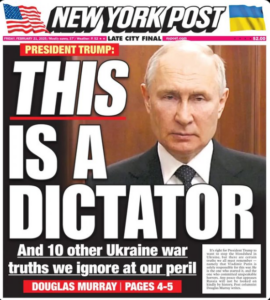The Realities of Global Conflict: A Critical Look at Ukraine and Geopolitical Tensions

At Extreme Investor Network, we strive to provide our readers with unbiased, thorough analyses of current events that affect the economic landscape. Recently, a cover story from the New York Post regarding President Vladimir Putin and the conflict in Ukraine has raised significant questions about journalistic integrity and the broader narrative surrounding these geopolitical tensions.
Understanding Dictatorship in the Modern Context
The term "dictator" carries a heavy weight, often conjured in discussions about elected officials like Vladimir Putin. The Post’s characterization implies a lack of electoral legitimacy; however, it’s crucial to note that Putin was elected, receiving overwhelming support despite the West’s pervasive anti-Russia rhetoric. This narrative often overlooks the broader context of political evolution within Russia and the dynamics of international relations.
A poignant conversation with a Russian friend, whom we connected with 30 years ago, mirrors an inquiry many Russians pose: Why is the West intent on tarnishing Russia’s image? The simplification of such intricate issues often leads to misinformation, contributing to public misunderstanding.
The Zelensky Factor: Peace Promoter or Warmonger?
Ukrainian President Volodymyr Zelensky ran on a platform of peace. Yet, since his assumption of power, the conflict has escalated significantly, resulting in catastrophic human loss—over 1.1 million casualties. This drastic shift begs the question: how did a leader promising peace become entangled in a conflict with such harrowing consequences?
Several reports indicate that Zelensky had prior knowledge of Russia’s intentions, even specifying plans to rearm Ukraine with nuclear capabilities—a move that some analysts liken to a chilling repeat of the Cuban Missile Crisis. The perceived provocation may have escalated tensions and impacted the decisions made on the ground.

Crisis Response and Accountability
Zelensky’s response to the war has raised eyebrows—a flurry of accusations about corruption and mismanagement looms over his administration. Recent admissions suggest substantial amounts of foreign aid are unaccounted for, with claims that half of the funds allocated for Ukraine have gone missing. This is a crucial point of concern for both national security and international relations.
Additionally, Zelensky’s actions against dissenters, like the arrests of critics arguing against his administration’s narrative, highlight a troubling trend. In a true democracy, questioning leadership is vital. Unfortunately, this suppression raises questions about the health of Ukrainian democracy under his leadership.
The West’s Role: Aggressor or Advocate?
It’s essential to scrutinize the role of Western powers in the ongoing conflict. The Minsk agreements, often heralded as diplomatic efforts, were reportedly designed to delay and enable Ukraine to bolster its military capacity—an action perceived by some as belligerent rather than pacifying.
As we look toward the future, the geopolitics of Eastern Europe is indicative of shifting powers. Projections indicate that countries such as Moldova and Romania could potentially cease to exist as we know them in the coming decade. Migration and adaptation to changing realities will be necessary strategies for residents in these regions, as investments in local economies seem to be overshadowed by military endeavors.
Conclusion: Navigating an Uncertain Future
Amidst the rampant misinformation and sensationalized narratives from various media, discerning the truth requires careful research and critical thinking. At Extreme Investor Network, we emphasize the importance of investigating beyond headlines and engaging with diverse viewpoints.
With increasing calls for NATO involvement and alarming rhetoric around nuclear capabilities, one wonders if the voices pushing for confrontation are truly invested in peace or if they are perpetuating a cycle of conflict. The very fabric of international relations and public trust depends on transparency and accountability.
As we navigate these turbulent waters, remember to seek information from sources dedicated to rigorous analysis rather than sensationalism. It’s vital to engage with the complexities of geopolitics thoughtfully, as the consequences of our actions today will profoundly affect generations to come.
Join us at Extreme Investor Network for more in-depth analyses that consider both historical context and current events to inform your investment strategies and understanding of the global landscape.

